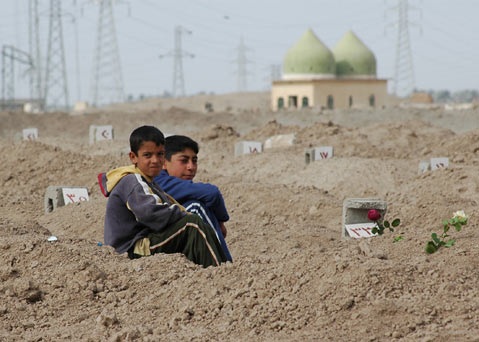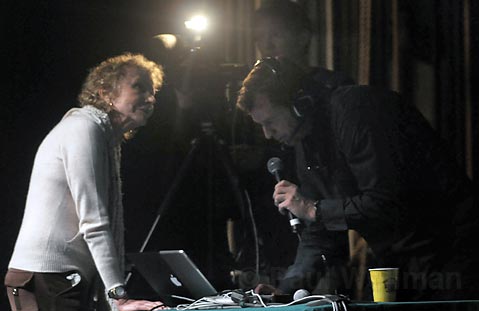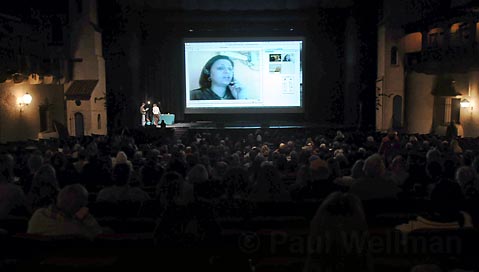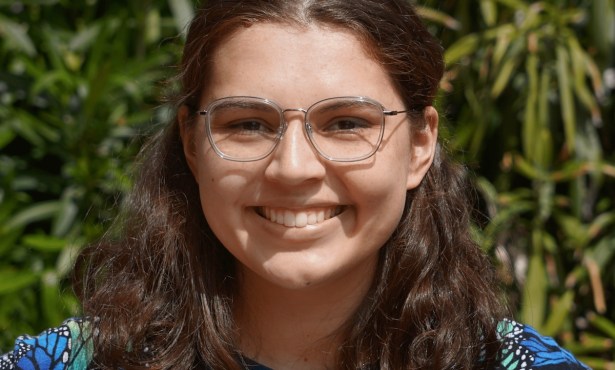Voice of the Iraqi People
Film Festival Screening Ends with Live Conversation with Iraqis

Anticipation hung in the air at the Arlington Theatre on Monday night, where Mark Manning‘s much talked about documentary, The Road to Fallujah, screened for the first time in Santa Barbara. No doubt few audience members were adequately prepared for the sobering images and sound bites about to play and even less prepared for the stark honesty of the Iraqi civilians who joined the theater via a live video feed after the film.
Janet Walker, chair of UCSB’s film studies department, announced the film’s candidacy for the Fund for Santa Barbara‘s Social Justice Award, and then Manning – director, producer, and cameraman – took the stage. He explained that he began filming for Fallujah in 2004, making this documentary a four-year labor of love for him and his production team.
Manning explained to the audience one of his motives for making the film: a desire to remind people of Iraq’s relevance despite the fact that the mainstream media is no longer giving it air time. “Many people are saying the war is over, the surge worked. I personally think the three or four months ahead of us will be the most important,” Manning said. “How Obama’s administration decides to pull out [of Iraq] is important for all of us.”

As Manning spoke, it was difficult to imagine that before this filmmaking journey Manning spent 22 years working as a deep-sea diver in Santa Barbara’s offshore oilfields – the very industry that many blame at least in part for the United State’s invasion of Iraq. In a phone interview, Manning explained the evolution of his decision to quit his well-paying job and take up a camera. “It was a gradual shift. But it was more that I felt like the country shifted away from me, and that I wasn’t shifting with it,” Manning explained. He went on to say that as the United States became increasingly aggressive with the war in Iraq, he felt increasingly alienated from his country, which eventually disturbed him enough to try to uncover what was really going on.
Manning ended his introduction to the Santa Barbara International Film Festival audience by stressing the point that throughout the war in Iraq, “Americans have had anonymity and have been hidden from our own government’s policy, and I think that has hurt us : Until we take an honest look at what happened here, we can’t as a people move forward in good conscience.” With that, Manning let the film roll.
One of first scenes was of a young Iraqi girl, about five years old, saying to someone behind the camera, “Then her eye popped out.”
“Whose eye?”
“Grandma’s eye.”
“Who did that to your grandma?”
“The Americans.”
And it quickly became clear whose voice would be heard in the theater that night: that of the Iraqi people.
Viewers also heard from a wide range of players in the war including military officials and soldiers, several conflict journalists, peace leaders such as South Africa’s Desmond Tutu, and American families who lost family members to the war. The audience also watched clips of addresses to the nation by George W. Bush, Donald Rumsfeld, and other U.S. administrative officials, all interlaced with Manning’s continued narrative. The sum of these parts was a question for each audience member to ask himself or herself: “Who are we really fighting here?”
The most intense part of the evening followed the film, however. After a few technical adjustments, Manning and his team successfully beamed two Iraqi citizens over the big screen, facilitating real-time dialogue across the world. Rana Al-Aiouby, a global speaker and activist for Iraqi civil rights and one of the film’s Middle East producers, was on the first line. Manning and Al-Aiouby met when they were both in Jordan attending a peace conference between families of Americans and Iraqis who had lost loved ones in the war and were attempting to come to a mutual understanding of their common humanity. (This meeting was featured in the documentary.) Manning was filming the event and Al-Aiouby was present with the Iraqi delegation as a translator.
Meeting Al-Aiouby was a twist of fate for Manning, who hadn’t originally planned to enter the war zone in Iraq while making the film, but had told his friends, “If I met just the right person I would probably go in.” He found that person in Al-Aiouby, and she became one of the pillars of Manning’s team.
On the second line was Maki Al-Nazzal, a former Fallujah resident now living in Syria. He works with displaced Iraqis in Jordan and is also one of the film’s Middle East producers.

Right off the bat it was clear that this wasn’t going to be a feel-good exchange. One audience member – Evan Wells, who happens to be an ad sales rep for The Independent – commented after apologizing on behalf of the Bush administration, “We’re optimistic about the new administration, seeing as for the last eight years we’ve been led by war criminals. Are you at all optimistic?” Al-Aiouby was the first to respond, saying that the Iraqi people are still seeing aggression on the ground and suffering around them every day. “American people need to put more pressure on their administration. You need to make your government prove to you [that] you are still a democracy,” she said.
Al-Nazzal’s response was no more hopeful. “We’ve had a lot of promises. Now is the time to do something good. It’s time for action,” he said. “It is very hard for us to be optimistic. We’ve been suffering for six years, two months now. Optimism is not a word we understand clearly unless we see something on the ground that helps preserve our dignity, gives us our houses back, allows us to see our families again. We need to see something, to touch something,” he explained.
Another question from the audience of what daily life was like for them during the war, was responded to with understandable bitterness. “This question will bring up all of the bad memories of what your country did to us. For me. the words make it worse,” Al-Aiouby said. “It was watching your people – your family – because for us we are all family, die every day, watching your children die every day : sitting, waiting, expecting your death any second,” she explained. Al-Nazzal’s response was similar. “We turned our soccer field into a graveyard at a time when at least 1,300 people were killed and 20,000 houses were demolished : When I thought of Americans coming to do this in Iraq I couldn’t believe it – I didn’t – but when I saw it I had to believe it,” he said.
In response to another audience member’s comment regarding many American’s restored faith in our country due to our new administration, Al-Aiouby again offered a sobering response. “The real ones who need help are the American people. I think we need to handle our problems ourselves, people to people. You are more than welcome here, but with no guns, with no troops – just people to people : You need to think about bringing change to the U.S. before you can bring change anywhere else.”
One of the last questions from the audience inquired as to what Iraqis feel is the best timeframe for withdrawal. The Iraqis did not respond with a clear answer but instead spoke about other issues related to the future of their country. “The real question is will the American government and big corporations let the rich resources of our country go back to the Iraqis?” said Al-Aiouby. “Does the U.S. military care about us as people? I don’t think so. They care about greed. We’ve been here for thousands of years, America has only been around for two hundred.” Al-Nazzal spoke along similar lines. “We need to remind the whole world who the Iraqis were and who we still are. Iraqis are more than able to rebuild their own country,” he said.
Manning later explained that people would take away from live discussion a better understanding of the consequences of this war. “[People should] get in touch with the suffering that war causes. For most Americans [in the audience on Tuesday], that was probably the first time they’ve actually met people who have been on the receiving end of our military action. It’s not a joyful kumbaya experience, but it’s real. I think that once you start that process of humanizing the other side you create a connection that is really hard to break.”
As Manning’s film continues making appearances in festivals across the country, he hopes that message will spread.



